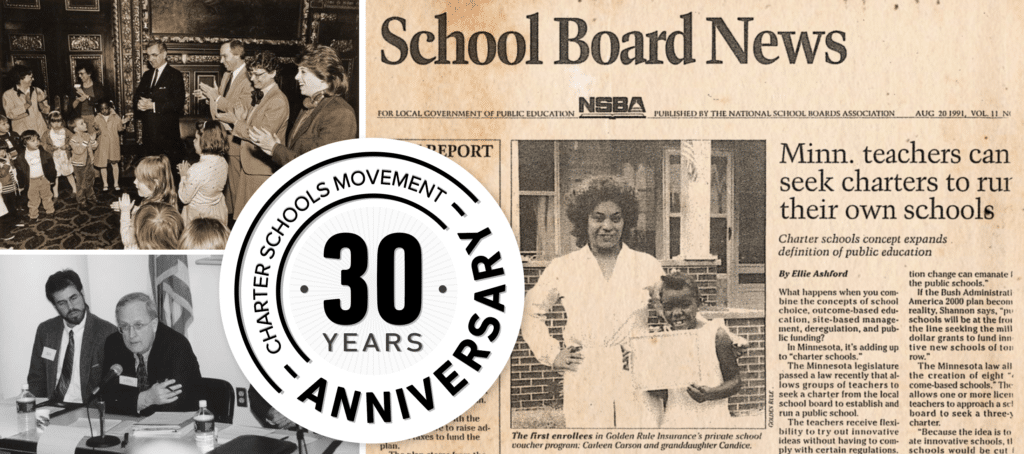by Ember Reichgott Junge, National Charter Schools Founders Library

Thirty years ago, on this day, June 4, 1991, Governor Arne Carlson signed the first chartering legislation into law in Minnesota and the nation. It was a rough three-year journey to pass it, and in my view as lead senate author, the bill was so severely compromised I thought a charter public school would never open. I was wrong. Today there are over 7,500 chartered schools in 45 states, District of Columbia, Puerto Rico and Guam.
As we look back 30 years, we celebrate the many successes of chartering. At the same time, I fear important history has been lost. We must refresh that history to inform today’s conversation around chartering.
Chartering is Bipartisan: The lead House author Rep. Becky Kelso and I were both Democrats. Both the Minnesota House and Senate had Democratic majorities. The governor was Republican. On the key vote for passage of chartering in the House, 56% of minority Republicans voted for the bill; 42% of majority Democrats voted for it, including the Democratic Speaker of the House.
That kind of vote doesn’t happen anymore in statehouses or Congress. The story of chartering is about both sides working together, both sides compromising, and the House Speaker ultimately allowing the will of the body to prevail, even if it was not the majority will of the governing party. This is a critical element, not just of chartering, but of democracy.
Chartering is a Pathway to Innovation and Ideas: The innovation of chartering was the law itself as systemic change; it was not about any single school. Chartering is a system redesign that allows innovation to happen. As chartering pioneer Ted Kolderie described, “Innovation is letting people try things. Chartering creates space where ‘different’ can be tried.”

In 1991, as in 2021, not every child was being served well by traditional district schools. Some were falling through the cracks, many of whom were children of low-income or of color. The chartering law allowed parents and teachers to take the lead to try something different, with the state holding them accountable for performance and results, even more so than for their counterpart district schools.
Chartering Empowers Teachers: As a union-endorsed Democrat, my primary motivation behind chartering legislation was the opportunity to empower teachers. I feared the K-12 education system was holding back talented teachers as well as talented students. I applauded the teacher-powered schools that evolved from chartering, as well as creation of the first union-initiated charter school authorizer in the country in 2011.
Sadly, today’s debate around chartering reflects the divisive nature of our overall politics, including the challenge of adhering to truth. As chartering faces myths from both the right and left, it is critically important that we preserve and record the factual basis around the origins of chartering from the bipartisan pioneers who were there. The Founders Library can help with all of that. Check it out at www.charterlibrary.org, or email me at ember.reichgott@gmail.com, because the Library is just getting started.

National Charter Schools Founders Library

